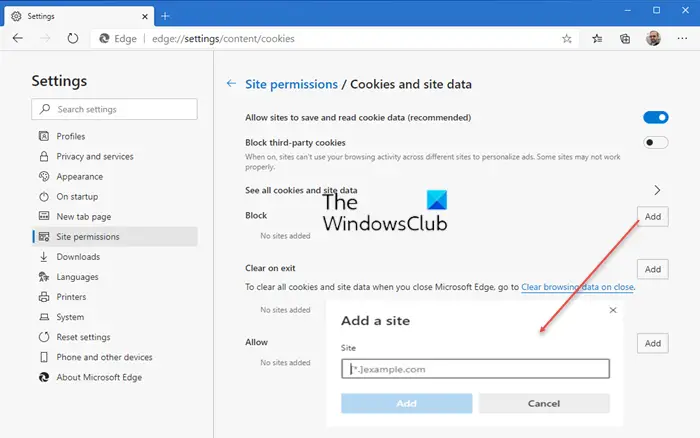If when you try to log in to your Microsoft Account or any other online account on the web, your browser should be set to allow Internet Cookies – which is the default setting in any case. A Cookie is a small snippet of information sent from a web server to a user’s browser, which then stores it.
But you may see the following message when you try to sign in to any Microsoft website using the Microsoft Edge web browser:
Cookies must be allowed. Your browser is currently set to block cookies. Your browser must allow cookies before you can use a Microsoft account. Cookies are small text files stored on your computer that tell Microsoft sites and services when you’re signed in. To learn how to allow cookies, see online help in your web browser.”
Microsoft Edge is blocking Cookies
If you see this message, you may have to configure your Edge (Chromium) browser settings and allow it to allow Cookies. Let us see how you can make Microsoft allow or block Cookies. Websites store cookies on your system so that your browsing can be enhanced in various ways for a better surfing experience.

Allow or block Cookies in Microsoft Edge
To allow or block Cookies on Microsoft Edge on Windows 11/10, do the following:
- Open Edge browser
- Click on the 3-dotted ‘More’ link to open its Settings
- Scroll down and click on Site permissions.
- Again scroll down till you see the setting for Cookies & Site data
- When here, from the 3 options, select one.
Alternatively, you can place the following pat in Edge address bar and hit Enter:
edge://settings/content/cookies
The available options are:
- Allow sites to save and read cookie data
- Block third-party cookies
- See all cookies and site data
- Block or Allow select sites
- Clear all cookies when you close Microsoft Edge.
To allow all Cookies, ensure that Don’t block cookies is selected, and restart Microsoft Edge.
This should help. If it does not, see if this post on how to configure Microsoft Edge to treat Cookies using Group Policy Editor or Registry Editor helps you.
Using another browser? These posts may then interest you:
i am trying to enable cookies on google chrome so i can sign documents please help
i need to e sign and google wont let me